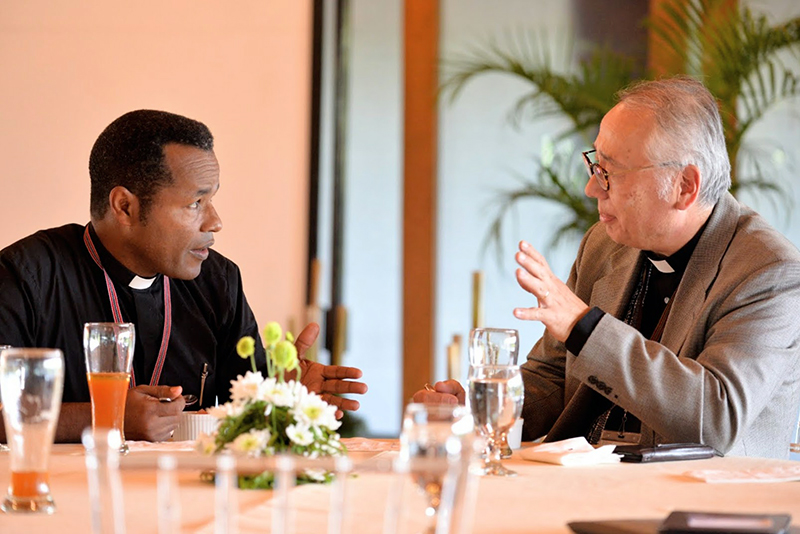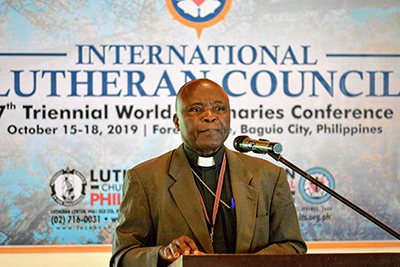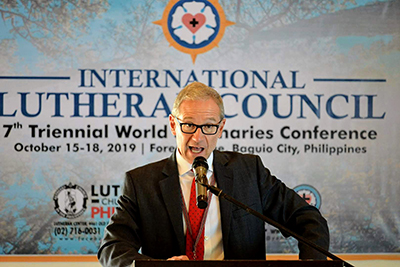
Participants in the ILC’s 2019 World Seminary Conference engage in discussions.
PHILIPPINES – The International Lutheran Council’s 2019 World Seminaries Conference continued on Wednesday.
The morning began with a service of Morning Prayer, following which participants heard additional presentations on the conference theme: “Confessional Lutheranism: Doctrinal Identity in Different Cultural Contexts.”
African Context

Rev. Dr. Nicholas Salifu presents during the 2019 ILC World Seminaries Conference.
The first presenter of the day was Rev. Dr. Nicolas Salifu of the Evangelical Lutheran Church of Ghana, whose presentation on “Spiritual Warfare in a Lutheran Perspective” provided an exploration of Lutheran doctrine within an African context.
“The early church accepted the influence of the demonic realm with great seriousness,” noted Dr. Salifu. And while Western culture has downplayed or even denied this aspect of historic Christian theology, Dr. Salifu said that the reality of spiritual warfare is readily apparent in the African context—and, indeed, in much of the rest of the world. “The West needs to realize that it is the only contemporary society that denies the reality of evil spirits,” he said, quoting the New Testament scholar Clinton Arnold.
When the reality of spiritual warfare is recognized, the Church is in a better position to respond appropriately to the spiritual needs of its people. “The weapons of our warfare are not guns,” Dr. Salifu noted. “The reason why physical weapons are useless in a spiritual war is because the real enemies are not people of flesh and blood but spiritual powers of wickedness.” The Christian’s true weapons for spiritual warfare are instead Word and Sacrament, Dr. Salifu continued, because through these “the Lord fights the devil.” We are to pray in Jesus’ name, for He is the one who conquers.
North American Context

Rev. Dr. Joel Biermann speaks on the state of religiosity in the United States of America.
In the afternoon, Rev. Dr. Joel Biermann led the conference’s fourth presentation on the conference theme, discussing “The Role of the Church in the Face of Declining Influence of Christianity in North America.” Dr. Biermann is Professor of Systematic Theology at Concordia Seminary in St. Louis, Missouri—a theological institution of The Lutheran Church—Missouri Synod.
Dr. Biermann’s analysis of the state of religion in the United States of America identified three key aspects: 1) the decline of Constantinianism which has “stripped Christianity of its former prestige and clout; 2) the rise of Moralistic Therapeutic Deism as a replacement faith with only the “remotest superficial resemblance to orthodox Christianity;” and 3) a dominant cultural mood of normal nihilism in which all values are mere preferences or opinions, easily dismissed or changed.
In light of this situation, Dr. Biermann asked: “What, precisely, is the church—the orthodox, faithful church that follows Christ and treasures the legacy of Luther and all other faithful disciples of Jesus—supposed to do?” The answer: “Resolutely follow her Lord with tenacity, trust, and a seeming indifference to the clamor of the world around.” This means neither retreating from the world, nor confronting it on its own terms, nor capitulating to the culture, but simply living out the calling of the Church in all times and places: preaching the Word of God and living lives “that are inherently and unarguably compelling through their simple and consistent witness to the reality of Christ at work in and through them.” “A rich and nuanced grasp of Luther’s insights into God’s rule of the world in terms of the two realms,” Dr. Biermann concluded, “allows Lutheran believers to understand and undertake with zeal their place and role in this world.”
Each of Wednesday’s major presentations was followed by plenary discussion. The convention also heard regional reports on the state of seminary education in Asia, Europe, Africa, North America, and South America throughout the day. It further took in several short parallel sessions during the final part of the afternoon before breaking for Vespers at St. Stephen Lutheran Church.
———————
